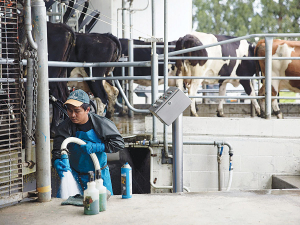DairyNZ Tests Heat Stress Solutions for Dairy Herds
New DairyNZ research will help farmers mitigate the impacts of heat stress on herds in high-risk regions of the country.
 The industry is reacting with relief after the Government's announcement of a new residency pathway.
The industry is reacting with relief after the Government's announcement of a new residency pathway.
After the Government released details on a new residency pathway, the industry is reacting with relief.
DairyNZ says the Government’s decision is exciting news for thousands of eligible dairy farm workers.
Chief executive Tim Mackle says the government announcement allows many valued international dairy workers to become residents and recognises their years of hard work on farms and positive contributions to the sector.
“We are genuinely delighted for these workers and their families. Many dairy workers can now plan and look forward to a future in New Zealand with their families,” says Mackle. “Their contribution will assist the dairy sector to continue playing a key role in New Zealand’s economy.”
Numerous dairy workers have had residency applications on hold since Covid-19 arrived on New Zealand’s shores in early 2020, with many without their families who are overseas.
“We have a significant number of international dairy workers in New Zealand who have been here for many years. They play an essential role in our farm teams and enable dairy to continue its vital contribution to New Zealand’s economy,” says Mackle.
“Our country and our rural communities will benefit from these workers and their families formally becoming New Zealanders. Their children help keep our rural schools open and their partners bring skills to our rural regions at a time when many employers are struggling to find staff.”
Meanwhile Meat Industry Association (MIA) chief executive Sirma Karapeeva says the residence pathway is a significant boost to the meat processing and exporting sector.
“The residence pathway will deliver much-needed certainty for our people and support the industry to continue maximising export revenue for the benefit of New Zealand,” says Karapeeva.
“Without this pathway, many of our people, including halal butchers, faced losing their right to stay in New Zealand.
“These roles are critical to supporting employment for thousands of other employees in the red meat sector, mainly in the regions, and the Government has clearly listened to our concerns.”
Karapeeva says one concern MIA has is around halal processing, with 43% of New Zealand total red meat exports halal certified for Muslim consumers in both Muslim and non-Muslim countries.
“Without halal butchers, there is a real potential that plants would be forced to reduce value-add processing or decide to not save certain products.
“That means less revenue for companies, farmers and the New Zealand economy. Halal processing generates over $3 billion of value-add halal certified meat products.
“However, this decision is only part of the solution. The industry is seeking a more permanent solution that would facilitate the entry of migrant halal butchers such as a special visa category for them.”
Federated Farmers immigration spokesperson Chris Lewis says he is ‘delighted’ by the decision.
“This gives 9,000 of the workers who have stayed on to help run our farms some certainty about their future,” Lewis says.
“And they deserve it. They’ve supported us through exceptionally difficult times on farm and we are going to need them even more in the future.
“There will be big smiles in cowsheds and tractors across the country after this announcement,” says Lewis.
New DairyNZ research will help farmers mitigate the impacts of heat stress on herds in high-risk regions of the country.
Budou are being picked now in Bridge Pā, the most intense and exciting time of the year for the Greencollar team – and the harvest of the finest eating grapes is weeks earlier than expected.
The Real Estate Institute of New Zealand (REINZ) has released its latest rural property report, providing a detailed view of New Zealand’s rural real estate market for the 12 months ending December 2025.
Rural retailer Farmlands has released it's latest round of half-year results, labeling it as evidence that its five-year strategy is delivering on financial performance and better value for members.
OPINION: "We are back to where we were a year ago," according to a leading banking analyst in the UK, referring to US president Donald Trump's latest imposition of a global 10% tariff on all exports into the US.
DairyNZ says the Government’s proposed Resource Management Act reform needs further work to ensure it delivers on its intent.

OPINION: A mate of yours truly reckons rural Manawatu families are the latest to suffer under what he calls the…
OPINION: If old Winston Peters thinks building trade relations with new nations, such as India, isn't a necessary investment in…